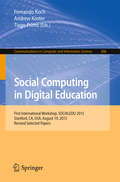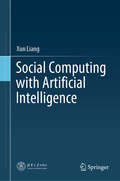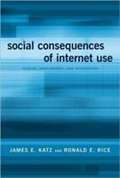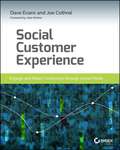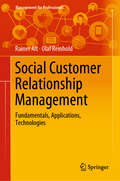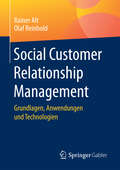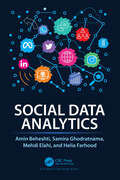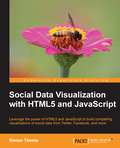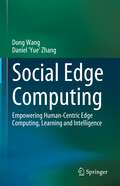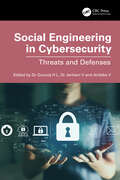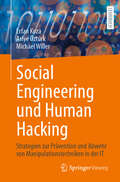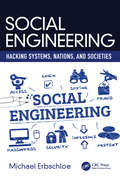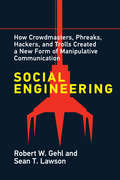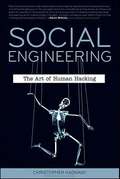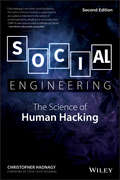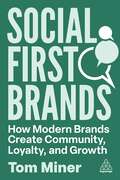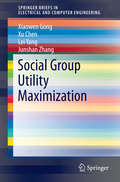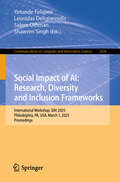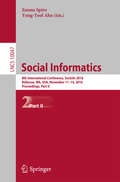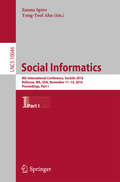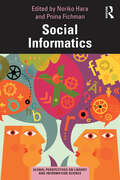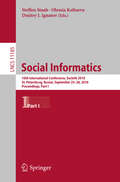- Table View
- List View
Social Computing in Digital Education
by Fernando Koch Andrew Koster Tiago PrimoThis book constitutes the refereed proceedings of the First International Workshop, SOCIALEDU 2015, held in Stanford, CA, USA, in August 2015. The workshop aimed to discuss computational models of social computing applied to Digital Education. The 9 revised full papers presented were carefully reviewed and selected from 12 submissions. The papers address issues such as novel data mining and machine learning for social intelligence in digital education. - Social modelling and simulation to investigate social behaviours, emotional intelligence, influence processes and other social aspects that may influence learning performance in an educational environment. - Smart environments and interactive systems of social computing in digital education. - Analysis of social media and media intelligence in digital education. - Mobile social gaming in digital education. - The utilization of mobile and wearable technology in social systems in digital education, and others.
Social Computing with Artificial Intelligence
by Xun LiangThis book provides a comprehensive introduction to the application of artificial intelligence in social computing, from fundamental data processing to advanced social network computing. To broaden readers’ understanding of the topics addressed, it includes extensive data and a large number of charts and references, covering theories, techniques and applications. It particularly focuses on data collection, data mining, artificial intelligence algorithms in social computing, and several key applications of social computing application, and also discusses network propagation mechanisms and dynamic analysis, which provide useful insights into how information is disseminated in online social networks. This book is intended for readers with a basic knowledge of advanced mathematics and computer science.
Social Consequences of Internet Use: Access, Involvement, and Interaction
by James E. Katz Ronald E. RiceAuthors explore the impact of the Internet on society from three perspectives: access to Internet technology, involvement with groups and communities through the Internet, and use of the Internet for social interaction and expression.
Social Customer Experience
by Dave Evans Joe CothrelSocial Customer Experience: Engage and Retain Customers through Social Media builds on the prior works of author Dave Evans. As an update to Evans's earlier book Social Media Marketing, the new Social Customer Experience connects the early cases presented in 2010 with significant, contemporary examples, key concepts, and best practices associated with the adoption of social technology by global brands. This latest edition offers a blueprint for transforming your organization's disparate social initiatives into a unified social experience strategy. Most people know that social technologies are transforming business, but few understand how those changes are happening across the organization. Whether in marketing, communications, customer care, digital media or product development these changes shape the way in which business manage the experience their customers have with the brand. Filled with practical examples of what to do, and illustrated with cases taken from real companies, Social Customer Experience fills in the gaps for companies who want to do more with social than just listen and experiment.Part I lays the groundwork by explaining the three waves of change that combine to form social customer experience: social technologies and their impact on Web 1.0 digital infrastructures; social customers and their impact on marketing and support operations; and the new discipline of customer experience management that is reframing the old sales-and-service-centric ways of thinking about how companies relate to customers. Part I concludes by defining the social customer experience ecosystem, both on and off your own web domain.Part II, "Your Social Presence," puts you on the ground, with tactics and examples for how to apply social technologies and achieve your business objectives, how to measure and analyze social data and show business value, and how to implement a best-practice approach to avoid common traps and pursue proven opportunities.Part III digs deeper into the five building blocks of social customer experience: organization, platform, content, people and tools. What's a social experience organization look like? What systems need to be in place? How do you get the most out of the social "objects" - content and other assets - that are the byproduct of great social customer experiences? How do connections between customers - the social graph - come into play? And what applications will you use - literally, what will you empower your customers to do? Part III answers these questions in the practical, method-driven style of authors Dave Evans and Joe Cothrel. Social Customer Experience features detailed exercises that show you how to translate learning into action, hands-on tutorials using today's social media tools and platforms, and compelling, modern case studies from organizations of all sizes--from the Fortune 500 to nonprofits and mom-n-pop main-street shops. As a bonus, the book also features resources and references to connect readers with the current thought leaders and sources of timely information.If you're interested in business, and how business is being reshaped by social technology, Social Customer Experience will show you a path to a new relationship with your customers, customers not only buy your products and services but get more out of them and go on to become partners in your business-selling, supporting, and innovating on your behalf.
Social Customer Relationship Management: Fundamentals, Applications, Technologies (Management for Professionals)
by Rainer Alt Olaf ReinholdSocial media has received considerable attention, and many potential benefits, as well as concerns, are now being discussed. This book explores how social media can successfully support business processes in marketing, sales and service in the context of customer relationship management (CRM). It presents the fundamentals of Social CRM and shows how small and large companies alike have implemented it.In turn, the book presents analytic and operational software tools that offer features for enhancing and streamlining interactions with customers. The book concludes with an overview of essential design areas that businesses need to bear in mind when introducing social media into their CRM strategies. In this regard, it also points out key success factors, limitations, and data protection aspects.
Social Customer Relationship Management: Grundlagen, Anwendungen und Technologien
by Rainer Alt Olaf ReinholdDieses Buch zeigt wie die Verbindung von Social Media mit Customer Relationship Management (CRM) Perspektiven für Marketing, Verkauf und Service schafft. Es kombiniert dazu Grundlagenwissen und Fallbeispiele. Für das Social CRM identifizieren die Autoren vier Verwendungszwecke sowie drei Umsetzungsstufen und thematisieren auch Fragen der Datenerschließung und der Datenqualität. Es richtet sich sowohl an Praktiker als auch an Lehrende und Studierende.
Social Cyber Engineering and Advanced Security Algorithms
by Soorena Merat Wahab AlmuhtadiThis book takes readers on a captivating journey through the history of social engineering, tracing its evolution from the mechanical marvels of the clockwork era and the rise of automata to the modern age of artificial intelligence and the looming dawn of quantum computing. It explores how social engineering tactics have adapted alongside technological advancements, exploiting human psychology and vulnerabilities across every era.Social Cyber Engineering and Advanced Security Algorithms delves into the intricate connections between human behavior, evolving technology, and the ever-changing landscape of cybersecurity. It examines how personal and psychological factors can be exploited in cyberattacks, providing real-world examples and case studies to illustrate these vulnerabilities. Beyond highlighting the challenges, the book offers proactive strategies and potential solutions for organizations and policymakers to navigate this complex terrain. It emphasizes the importance of algorithmic resilience in employee categorization and training and explores the transformative potential of quantum computing in bridging mental health and cybersecurity.This book serves as a guide for computer scientists, engineers, and professionals interested in understanding the intricate relationship between human behavior, technology, and security in the digital age. It offers a unique perspective on the past, present, and future of social engineering, providing valuable insights for anyone seeking to build a more secure and resilient digital world.
Social Data Analytics
by Amin Beheshti Samira Ghodratnama Mehdi Elahi Helia FarhoodThis book is an introduction to social data analytics along with its challenges and opportunities in the age of Big Data and Artificial Intelligence. It focuses primarily on concepts, techniques and methods for organizing, curating, processing, analyzing, and visualizing big social data: from text to image and video analytics. It provides novel techniques in storytelling with social data to facilitate the knowledge and fact discovery. The book covers a large body of knowledge that will help practitioners and researchers in understanding the underlying concepts, problems, methods, tools and techniques involved in modern social data analytics. It also provides real-world applications of social data analytics, including: Sales and Marketing, Influence Maximization, Situational Awareness, customer success and Segmentation, and performance analysis of the industry. It provides a deep knowledge in social data analytics by comprehensively classifying the current state of research, by describing in-depth techniques and methods, and by highlighting future research directions. Lecturers will find a wealth of material to choose from for a variety of courses, ranging from undergraduate courses in data science to graduate courses in data analytics.
Social Data Visualization with HTML5 and JavaScript
by Simon TimmsThis book is a fast-paced guide full of step-by-step instructions that teach you how to visualize social data using HTML5 and JavaScript.This book is for developers who are excited about data and who want to share that excitement with others. Developers who are interested in the data which can be extracted from social networks will also find this book hugely beneficial.Readers should have a working knowledge of both JavaScript and HTML.
Social Edge Computing: Empowering Human-Centric Edge Computing, Learning and Intelligence
by Dong Wang Daniel 'Yue' ZhangThe rise of the Internet of Things (IoT) and Artificial Intelligence (AI) leads to the emergence of edge computing systems that push the training and deployment of AI models to the edge of networks for reduced bandwidth cost, improved responsiveness, and better privacy protection, allowing for the ubiquitous AI that can happen anywhere and anytime. Motivated by the above trend, this book introduces a new computing paradigm, the Social Edge Computing (SEC), that empowers human-centric edge intelligent applications by revolutionizing the computing, intelligence, and the training of the AI models at the edge. The SEC paradigm introduces a set of critical human-centric challenges such as the rational nature of edge device owners, pronounced heterogeneity of the edge devices, real-time AI at the edge, human and AI interaction, and the privacy of the edge users. The book addresses these challenges by presenting a series of principled models and systems that enable the confluence of the computing capabilities of devices and the domain knowledge of the people, while explicitly addressing the unique concerns and constraints from humans. Compared to existing books in the field of edge computing, the vision of this book is unique: we focus on the social edge computing (SEC), an emerging paradigm at the intersection of edge computing, AI, and social computing. This book discusses the unique vision, challenges and applications in SEC. To our knowledge, keeping humans in the loop of edge intelligence has not been systematically reviewed and studied in an existing book. The SEC vision generalizes the current machine-to-machine interactions in edge computing (e.g., mobile edge computing literature), and machine-to-AI interactions (e.g., edge intelligence literature) into a holistic human-machine-AI ecosystem.
Social Engineering and Nonverbal Behavior Set
by Christopher HadnagySocial Engineering: The Art of Human HackingFrom elicitation, pretexting, influence and manipulation all aspects of social engineering are picked apart, discussed and explained by using real world examples, personal experience and the science behind them to unraveled the mystery in social engineering.Examines social engineering, the science of influencing a target to perform a desired task or divulge informationArms you with invaluable information about the many methods of trickery that hackers use in order to gather information with the intent of executing identity theft, fraud, or gaining computer system accessReveals vital steps for preventing social engineering threatsUnmasking the Social Engineer: The Human Element of SecurityFocuses on combining the science of understanding non-verbal communications with the knowledge of how social engineers, scam artists and con men use these skills to build feelings of trust and rapport in their targets. The author helps readers understand how to identify and detect social engineers and scammers by analyzing their non-verbal behavior. Unmasking the Social Engineer shows how attacks work, explains nonverbal communications, and demonstrates with visuals the connection of non-verbal behavior to social engineering and scamming.Clearly combines both the practical and technical aspects of social engineering securityReveals the various dirty tricks that scammers usePinpoints what to look for on the nonverbal side to detect the social engineer
Social Engineering in Cybersecurity: Threats and Defenses
by Dr Gururaj H L Dr Janhavi V Ambika VIn today’s digitally interconnected world, the threat landscape has evolved to include not just sophisticated technical exploits but also the art of human manipulation. Social engineering attacks have emerged as a formidable and often underestimated threat to information security. The primary aim of this textbook is to provide a comprehensive and in-depth exploration of social engineering attacks. The book seeks to equip cybersecurity professionals, IT practitioners, students, and anyone concerned with information security with the knowledge and tools needed to recognize, prevent, and mitigate the risks posed by social engineering. The scope of this textbook is broad and multifaceted. It covers a wide range of social engineering attack vectors, including phishing, vishing, pretexting, baiting, tailgating, impersonation, and more. Each attack vector is dissected, with detailed explanations of how they work, real-world examples, and countermeasures. Key Features • Comprehensive Coverage: Thorough exploration of various social engineering attack vectors, including phishing, vishing, pretexting, baiting, quid pro quo, tailgating, impersonation, and more. • Psychological Insights: In-depth examination of the psychological principles and cognitive biases that underlie social engineering tactics. • Real-World Case Studies: Analysis of real-world examples and high-profile social engineering incidents to illustrate concepts and techniques.• Prevention and Mitigation: Practical guidance on how to recognize, prevent, and mitigate social engineering attacks, including security best practices. • Ethical Considerations: Discussion of ethical dilemmas and legal aspects related to social engineering that emphasizes responsible use of knowledge. This comprehensive textbook on social engineering attacks provides a deep and practical exploration of this increasingly prevalent threat in cybersecurity. It covers a wide array of attack vectors, including phishing, vishing, pretexting, and more, offering readers an in-depth understanding of how these attacks work. The book delves into the psychology behind social engineering and examines the cognitive biases and emotional triggers that make individuals susceptible. Real-world case studies illustrate concepts and techniques while practical guidance equips readers with the knowledge to recognize, prevent, and mitigate social engineering threats.
Social Engineering und Human Hacking: Strategien zur Prävention und Abwehr von Manipulationstechniken in der IT
by Erfan Koza Asiye Öztürk Michael WillerEntdecken Sie die psychologischen Tricks und Techniken, mit denen Human Hacker Ihre persönlichen Gefühle, Eigenschaften und digitale Verhaltensmuster ausnutzen, um die Informationssicherheit gezielt zu kompromittieren. Dieses Lehrbuch bietet Ihnen einen spielerischen Ansatz, um die Funktionsweise von Social Engineering zu verstehen und sich erfolgreich dagegen zu verteidigen. Erfahren Sie zudem, wie Sie Ihre Wahrnehmung schärfen, Ihre Emotionen kontrollieren und effektive Abwehrstrategien entwickeln können, um Ihre Daten und Ihr Unternehmen vor den Taktiken der Angreifer zu schützen. Ausgestattet mit psychologischen Denkmodellen sowie Abwehrstrategien, werden Sie bereit sein, sich den Herausforderungen des modernen Sicherheitsumfelds zu stellen.
Social Engineering: Hacking Systems, Nations, and Societies
by Michael ErbschloeThis book analyzes of the use of social engineering as a tool to hack random systems and target specific systems in several dimensions of society. It shows how social engineering techniques are employed well beyond what hackers do to penetrate computer systems. And it explains how organizations and individuals can socially engineer their culture to help minimize the impact of the activities of those who lie, cheat, deceive, and defraud. After reading this book, you’ll be able to analyze how organizations work and the need for security to maintain operations and sustainability, and be able to identify, respond to and counter socially engineered threats to security.
Social Engineering: How Crowdmasters, Phreaks, Hackers, and Trolls Created a New Form of Manipulativ e Communication
by Robert W. Gehl Sean T. LawsonManipulative communication—from early twentieth-century propaganda to today&’s online con artistry—examined through the lens of social engineering. The United States is awash in manipulated information about everything from election results to the effectiveness of medical treatments. Corporate social media is an especially good channel for manipulative communication, with Facebook a particularly willing vehicle for it. In Social Engineering, Robert Gehl and Sean Lawson show that online misinformation has its roots in earlier techniques: mass social engineering of the early twentieth century and interpersonal hacker social engineering of the 1970s, converging today into what they call &“masspersonal social engineering.&” As Gehl and Lawson trace contemporary manipulative communication back to earlier forms of social engineering, possibilities for amelioration become clearer. The authors show how specific manipulative communication practices are a mixture of information gathering, deception, and truth-indifferent statements, all with the instrumental goal of getting people to take actions the social engineer wants them to. Yet the term &“fake news,&” they claim, reduces everything to a true/false binary that fails to encompass the complexity of manipulative communication or to map onto many of its practices. They pay special attention to concepts and terms used by hacker social engineers, including the hacker concept of &“bullshitting,&” which the authors describe as a truth-indifferent mix of deception, accuracy, and sociability. They conclude with recommendations for how society can undermine masspersonal social engineering and move toward healthier democratic deliberation.
Social Engineering: The Art of Human Hacking
by Christopher HadnagyThe first book to reveal and dissect the technical aspect of many social engineering maneuvers From elicitation, pretexting, influence and manipulation all aspects of social engineering are picked apart, discussed and explained by using real world examples, personal experience and the science behind them to unraveled the mystery in social engineering. Kevin Mitnick-one of the most famous social engineers in the world-popularized the term "social engineering. " He explained that it is much easier to trick someone into revealing a password for a system than to exert the effort of hacking into the system. Mitnick claims that this social engineering tactic was the single-most effective method in his arsenal. This indispensable book examines a variety of maneuvers that are aimed at deceiving unsuspecting victims, while it also addresses ways to prevent social engineering threats. Examines social engineering, the science of influencing a target to perform a desired task or divulge information Arms you with invaluable information about the many methods of trickery that hackers use in order to gather information with the intent of executing identity theft, fraud, or gaining computer system access Reveals vital steps for preventing social engineering threats Social Engineering: The Art of Human Hacking does its part to prepare you against nefarious hackers-now you can do your part by putting to good use the critical information within its pages.
Social Engineering: The Science of Human Hacking
by Christopher HadnagyHarden the human firewall against the most current threats Social Engineering: The Science of Human Hacking reveals the craftier side of the hacker’s repertoire—why hack into something when you could just ask for access? Undetectable by firewalls and antivirus software, social engineering relies on human fault to gain access to sensitive spaces; in this book, renowned expert Christopher Hadnagy explains the most commonly-used techniques that fool even the most robust security personnel, and shows you how these techniques have been used in the past. The way that we make decisions as humans affects everything from our emotions to our security. Hackers, since the beginning of time, have figured out ways to exploit that decision making process and get you to take an action not in your best interest. This new Second Edition has been updated with the most current methods used by sharing stories, examples, and scientific study behind how those decisions are exploited. Networks and systems can be hacked, but they can also be protected; when the “system” in question is a human being, there is no software to fall back on, no hardware upgrade, no code that can lock information down indefinitely. Human nature and emotion is the secret weapon of the malicious social engineering, and this book shows you how to recognize, predict, and prevent this type of manipulation by taking you inside the social engineer’s bag of tricks. Examine the most common social engineering tricks used to gain access Discover which popular techniques generally don’t work in the real world Examine how our understanding of the science behind emotions and decisions can be used by social engineers Learn how social engineering factors into some of the biggest recent headlines Learn how to use these skills as a professional social engineer and secure your company Adopt effective counter-measures to keep hackers at bay By working from the social engineer’s playbook, you gain the advantage of foresight that can help you protect yourself and others from even their best efforts. Social Engineering gives you the inside information you need to mount an unshakeable defense.
Social First Brands: How Modern Brands Create Community, Loyalty, and Growth
by Tom MinerAs platforms come and go, features fall in and out of fashion and consumer preferences change, brands need to understand how to build social media strategies that transcend trends and create genuine connection. In Social First Brands, expert Tom Miner explores how brands who put their social media front and center in their marketing efforts are reaping the benefits, building genuine communities with their customers and developing true brand loyalty. With many brands seeing social media solely as a way to mass promote their products, brands who really put social at the front and center are able to connect with consumers in authentic ways creating audience empathy and emotional resonance. By understanding how social media speaks to human behavior, brands who put social first are able to move beyond quick wins and hacks and create genuine connections and conversations between brand and customer delivering real value. From understanding the steps for creating a social media strategy that is bespoke, choosing and developing the right personality for your brand on social media or understanding how to create content that is consistent, this book covers everything you need to know to ensure your brand's socials generate loyal fans. With real-world examples from companies such as Crocs, Stanley, Funko and Ryanair, use this book to ensure your social media strategy creates real impact.
Social Group Utility Maximization
by Xiaowen Gong Xu Chen Lei Yang Junshan ZhangThis SpringerBrief explains how to leverage mobile users' social relationships to improve the interactions of mobile devices in mobile networks. It develops a social group utility maximization (SGUM) framework that captures diverse social ties of mobile users and diverse physical coupling of mobile devices. Key topics include random access control, power control, spectrum access, and location privacy. This brief also investigates SGUM-based power control game and random access control game, for which it establishes the socially-aware Nash equilibrium (SNE). It then examines the critical SGUM-based spectrum access game, and pseudonym change game for personalized location privacy. The authors propose future work on extending the SGUM framework to negative social ties, to demonstrate relevance to security applications and span the continuum between zero-sum game (ZSG) and non-cooperative game (NCG). Social Group Utility Maximization targets researchers and professionals working on mobile networks and social networks. Advanced-level students in electrical engineering and computer science will also find this material useful for their related courses.
Social Impact of AI: International Workshop, SIAI 2025, Philadelphia, PA, USA, March 1, 2025, Proceedings (Communications in Computer and Information Science #2599)
by Leonidas Deligiannidis Yetunde Folajimi Salem Othman Shawren SinghThe workshop proceedings SIAI 2025 constitutes the refereed proceedings of the fourth International Workshop on Social Impact of AI, SIAI 2025, which was held in Philadelphia, PA, USA, in March 2025. The 8 full papers, 4 short papers, and one poster presented in these proceedings were carefully reviewed and selected from 26 submissions. SIAI-ReDI 2025 centered on the development and assessment of inclusive AI frameworksthat prioritize ethical design, equitable deployment, and cultural context. The workshop&’scall for papers invited submissions across a range of urgent topics, including: Algorithmic fairness and transparencyInclusive AI education and workforce strategiesAI in marginalized and underrepresented communitiesIntersectionality, gender, and accessibility in AICross-cultural AI governance and regulationPublic trust, participatory AI, and responsible design
Social Influence on Digital Content Contribution and Consumption: Theories, Empirical Analyses, and Practices (Management for Professionals)
by Xuejing MaThis book examines users’ digital content contribution and consumption behavior from a social perspective. Digital content is everywhere—from search results on search engines to posts on social media. Incentivizing users to contribute abundant content and motivating users to engage in and pay for digital content are vital for online platforms, especially those relying on digital content generated by users. This book develops a theoretical framework to incorporate social influence, including social presence, social interaction, social comparison, social loafing, and social relationships, in users’ digital content contribution and consumption decisions. Further, using a large volume of data from online platforms, the author empirically studies the role of social interaction in digital content provision and monetization from the supply side. Also, regarding the digital content demand side, this book explores how to boost content consumption via social motives and social norms. The book enriches the understanding of social influence in digital content contribution and consumption and provides practical suggestions for digital platforms’ mechanism design.
Social Informatics
by Emma Spiro Yong-Yeol AhnThe two-volume set LNCS 10046 and 10047 constitutes the proceedings of the 8th International Conference on Social Informatics, SocInfo 2016, held in Bellevue, WA, USA, in November 2016. The 36 full papers and 39 poster papers presented in this volume were carefully reviewed and selected from 120 submissions. They are organized in topical sections named: networks, communities, and groups; politics, news, and events; markets, crowds, and consumers; and privacy, health, and well-being.
Social Informatics
by Emma Spiro Yong-Yeol AhnThe two-volume set LNCS 10046 and 10047 constitutes the proceedings of the 8th International Conference on Social Informatics, SocInfo 2016, held in Bellevue, WA, USA, in November 2016. The 36 full papers and 39 poster papers presented in this volume were carefully reviewed and selected from 120 submissions. They are organized in topical sections named: networks, communities, and groups; politics, news, and events; markets, crowds, and consumers; and privacy, health, and well-being.
Social Informatics (Global Perspectives on Library and Information Science)
by Pnina Fichman Noriko HaraSocial informatics examines how society is influenced by digital technologies and how digital technologies are shaped by political, economic, and socio-cultural forces. The chapters in this edited volume use social informatics approaches to analyze recent issues in our increasingly data-intensive society.Taking a social informatics perspective, this edited volume investigates the interaction between society and digital technologies and includes research that examines individuals, groups, organizations, and nations, as well as their complex relationships with pervasive mobile and wearable devices, social media platforms, artificial intelligence, and big data. This volume’s contributors range from seasoned and renowned researchers to upcoming researchers in social informatics. The readers of the book will understand theoretical frameworks of social informatics; gain insights into recent empirical studies of social informatics in specific areas such as big data and its effects on privacy, ethical issues related to digital technologies, and the implications of digital technologies for daily practices; and learn how the social informatics perspective informs research and practice.Social Informatics provides the first book-length overview of Social Informatic research in recent years and will be essential reading for academics and students engaged in the study of information science, internet studies, emerging technologies, digital media, new media studies, computer science, the sociology of communication, and data science.
Social Informatics: 10th International Conference, SocInfo 2018, St. Petersburg, Russia, September 25-28, 2018, Proceedings, Part I (Lecture Notes in Computer Science #11185)
by Steffen Staab Dmitry I. Ignatov Olessia KoltsovaThe two-volume set LNCS 11185 + 11186 constitutes the proceedings of the 10th International Conference on Social Informatics, SocInfo 2018, held in Saint-Petersburg, Russia, in September 2018. The 30 full and 32 short papers presented in these proceedings were carefully reviewed and selected from 110 submissions. They deal with the applications of methods of the social sciences in the study of socio-technical systems, and computer science methods to analyze complex social processes, as well as those that make use of social concepts in the design of information systems.
